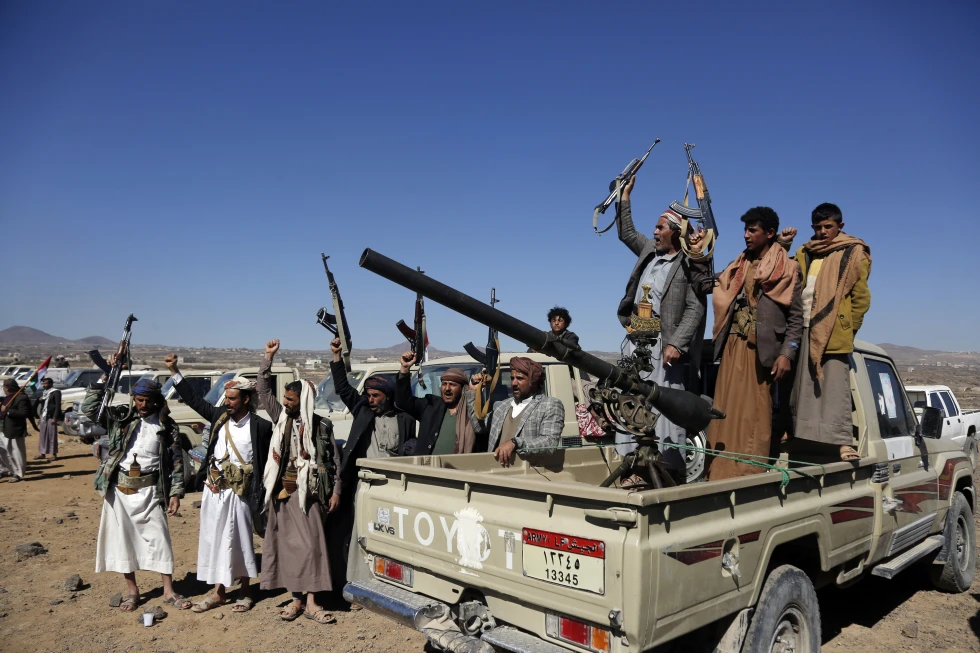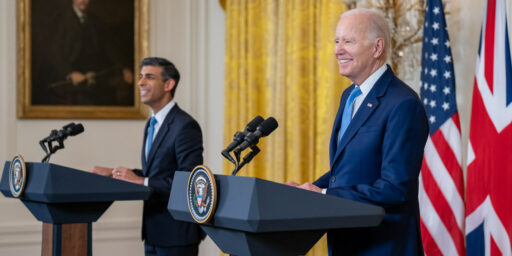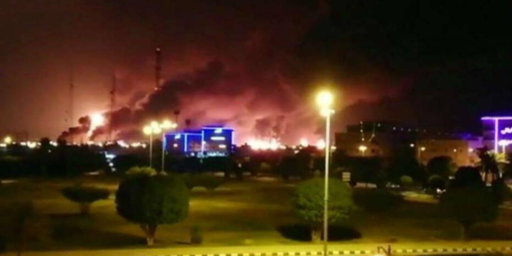Middle East Cycle of Violence Escalates
The game of tit-for-tat continues.

AP, 17 January (“Yemen’s Houthi rebels attack a US-owned ship in the Gulf of Aden with bomb-carrying drone“):
A U.S.-owned ship in the Gulf of Aden came under attack Wednesday from a bomb-carrying drone launched by Yemen’s Houthi rebels, officials said.
The attack on the Genco Picardy represented the second in recent days targeting vessels directly linked to America after U.S.-led strikes targeting the Houthis. It also underlined the risks to shipping in the vital waterway amid Israel’s war on Hamas in the Gaza Strip.
[…]
Brig. Gen. Yahya Saree, a military spokesman for the Houthis, identified the ship attacked as the bulk carrier Genco Picardy. Satellite-tracking data had put that vessel off Saudi Arabia in recent days as it was bound for India.
The Houthis “confirm that a response to the American and British attacks is inevitably coming, and that any new attack will not remain without response and punishment,” Saree said in a prerecorded video address.
AP, 18 January (“US military launches another barrage of missiles against Houthi sites in Yemen“):
The U.S. military fired another wave of ship- and submarine-launch missile strikes against Houthi-controlled sites Wednesday, U.S. Central Command said, marking the fourth time in days it has directly targeted the group in Yemen as violence that ignited in the wake of the Israel-Hamas war continues to spill over in the Middle East.
The strikes were launched from the Red Sea and hit 14 missiles that the command deemed an “imminent threat.” The strikes followed an official announcement Wednesday that the U.S. has put the Houthis back on its list of specially designated global terrorists. The sanctions that come with the formal designation are meant to sever violent extremist groups from their sources of financing.
“Forces conducted strikes on 14 Iran-backed Houthi missiles that were loaded to be fired in Houthi controlled areas in Yemen,” Central Command said in a statement posted on X late Wednesday. “These missiles on launch rails presented an imminent threat to merchant vessels and U.S. Navy ships in the region and could have been fired at any time, prompting U.S. forces to exercise their inherent right and obligation to defend themselves.”
AP, 16 January (“Iran attacks alleged militant bases in Pakistan; Islamabad says ‘unprovoked’ strikes kill 2 children“):
Iran launched attacks Tuesday in Pakistan targeting what it described as bases for the militant group Jaish al-Adl, potentially further raising tensions in a Middle East already roiled by Israel’s war on Hamas in the Gaza Strip. Pakistan said the strikes killed two children and wounded three others in an assault it described as an “unprovoked violation” of its airspace.
Confusion followed the announcement from Iran as state media reports on it soon disappeared. However, the attack inside of nuclear-armed Pakistan by Iran threatens the relations between the two countries, which long have eyed each other with suspicion while maintaining diplomatic relations.
The attack also follows Iranian strikes on Iraq and Syria less than a day earlier, as Tehran lashes out following a dual suicide bombing this month claimed by the Sunni militant group Islamic State that killed over 90 people.
[…]
Jaish al-Adl, or the “Army of Justice,” is a Sunni militant group founded in 2012 which largely operates across the border in Pakistan. The militants have claimed bombings and kidnapped Iranian border police in the past.
Iran has fought in border areas against the militants, but a missile-and-drone attack on Pakistan is unprecedented for Iran. Iranian reports described the strikes as happening in the mountains of Pakistan’s Baluchistan province.
Pakistan’s Foreign Ministry issued a strongly worded rebuke of the strikes.
“Pakistan strongly condemns the unprovoked violation of its airspace by Iran which resulted in death of two innocent children while injuring three girls,” the statement read. “This violation of Pakistan’s sovereignty is completely unacceptable and can have serious consequences.”
AP, 18 January (“Pakistan launches airstrikes in Iran, killing 9, after an earlier attack by Tehran“):
Pakistan’s air force launched retaliatory airstrikes early Thursday in Iran against alleged militant hideouts, killing at least nine people and further raising tensions between the neighbors.
Thursday’s attack followed one by Iran inside Pakistan on Tuesday. Both appeared to target Baluch militant groups with similar separatist goals on either side of the Iran-Pakistan border. The countries accuse each other of providing safe haven to the groups in their respective territories.
The attacks also come as the Middle East remains unsettled by Israel’s war with Hamas in the Gaza Strip. Iran also staged airstrikes late Monday in Iraq and Syria over an Islamic State-claimed suicide bombing that killed over 90 people in early January.
The strikes imperiled diplomatic relations between Islamabad and Tehran, as Iran and nuclear-armed Pakistan have long regarded each other with suspicion over militant attacks. Each nation also faces its own internal political pressures, and the strikes may in part be in response to that.
Pakistan’s Foreign Ministry described its attack Thursday as “a series of highly coordinated and specifically targeted precision military strikes.”
“This morning’s action was taken in light of credible intelligence of impending large scale terrorist activities,” it said in a statement. “This action is a manifestation of Pakistan’s unflinching resolve to protect and defend its national security against all threats.”
Pakistan’s military described using “killer drones, rockets, loitering munitions and standoff weapons” in the attack. Standoff weapons are missiles fired from aircraft at a distance — likely meaning Pakistan’s fighter jets didn’t enter Iranian airspace.
Thus far, the attacks all appear designed to give the appearance of doing something meaningful without triggering a full-on war between state actors. That’s ripe for miscalculation, especially as the number of actors increases.






One way to look at this is that once the US pulled out of Afghanistan and most of Iraq, it is less of a common target and the region can get back to its Sunni/Shia warfare. Maybe the best next move is to leave Syria.
On other blogs they are actively pushing for us to invade Yemen. Not having done so already is a sign that Biden is a pussy. First, I think many of the people saying this stuff are classic chickenhawks. Hate to use this argument and maybe its not the right term, but people who were never at risk themselves, or family, often seem to feel pretty good about sending troops to invade other countries at the drop of a hat. Second, even if we were intending to invade Yemen, the logistics would be a bitch. I dont really see Saudi Arabia or Oman letting us use their country to stage so we would be making amphibious landings and parachuting into hilly/mountainous areas against experienced hill tribe fighters. We have tried some version of this elsewhere and it hasn’t gone that well, but if we are going to do it again we could at least plan and actually have an endgame for a change.
Mostly, I think context matters. A lot of attacks have been launched but little damage done. Would the expenditure of lives and money to invade be worth it? What would stop the Houthis from running off to hide in the mountains and come out to launch drones again once we leave? This needs a real plan and not just a reflexive invade and hope they greet us as liberators.
Steve
@steve:
Given the history of the past 20 years in Afghanistan, Iraq, Libya, and Syria, it takes some pretty strong irrationality to think invading Yemen is a good idea.
Does anyone know what international law states if one country retaliates against armed aggression coming from a part of another country not controlled by the government?
@MarkedMan:
I believe the relevant portion of the law is the section that says the US can do whatever the hell it feels like doing.
We are not going to invade Yemen. That would be insane. How many times do we have to go through this: no jungles, no mountains. So long as our weapons stocks hold out we can just keep on blowing up Houthis at no risk to ourselves.
The urgent thing the West needs to do is start building weapons factories. We need to be on a partial war footing because we are burning through our stocks and the UK, Germany and France never had much to begin with.
The Iranian cross-border attack is uncharacteristically direct for the regime. I wonder what internal political reason might be behind it.
@Kingdaddy:
China’s trying to build a pipeline to the ME to secure oil that the US can’t just interrupt with a couple destroyers. Iran would really like that pipeline to happen so that they can get around US sanctions. This terrorist/guerrilla outfit on the Pak/Iran border is making trouble, demanding a toll on anything that goes through their territory. That’s one speculation, anyway. I’m sure there are more theories.
@steve: For the chicken hawk types, the motivation is usually FAFO, so no, a “real” plan is unlikely.
One thing that disturbs me is: Does Iran not recognize that it is intruding onto the territory of a nuclear-armed power? I can think of no circumstances under which we westerners would unleash nuclear weapons against Iran (Israel is a possible exception), but Pakistan may have fewer compunctions.
@Michael Reynolds:
If we can and do determine these actions are at the behest of a small number of Houthis we might do whatever it takes to take them out, I would not feel confident we are not “going in” by all definitions.
Here’s the problem: We can take out a lot of their stuff, most it, probably, but to disrupt shipping all these guys have to do is lob an occasional missile or UAV over the strait, that’s it. It’s unlikely we will be able to stop that completely from ships and Reapers hovering overhead. If it continues after humanitarian aid flows into Gaza again they will become a serious “issue”.
@SC_Birdflyte:
Should probably take the image of this being Iran attacking Pakistan with a grain of salt. It appears both sides are striking radical nut-jobs in the nether reaches of Baluchistan. Has to be done every so often like taking out the trash. It may well be they are have agreed, under the rose, to jointly do a bit of neighborhood cleaning.
The disaster of ISIS has everybody’s antenna up on radical Islamics.